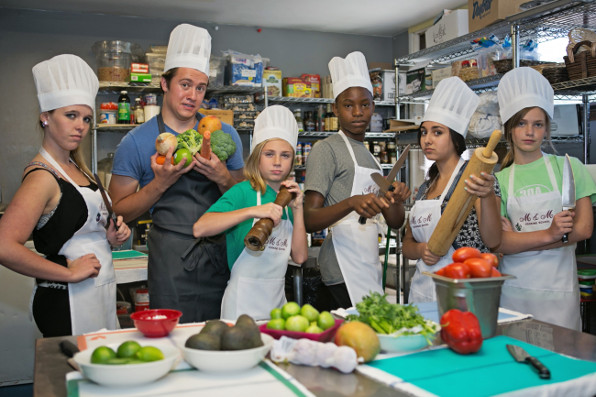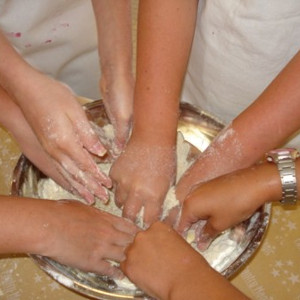I wish I had a dollar for every time I’ve mentioned Home Economics class in high school to young people and they’ve given me back a blank stare. Life skills in general, and food preparation in particular, are not being taught in school, anymore, and that’s contributing to a generation of badly fed teens…
 Teens taking cooking seriously at the Mawa’s Kichen Cooking Boot Camp in Aspen, Col.
Teens taking cooking seriously at the Mawa’s Kichen Cooking Boot Camp in Aspen, Col.
A new study published in the Journal of Nutrition Education and Behavior says developing cooking skills as a young adult may have long-term benefits for health and nutrition.
The impact of developing cooking skills early in life may not be apparent until later in adulthood when individuals have more opportunity and responsibility for meal preparation,” said study Lead Author Jennifer Utter, PhD, MPH, University of Auckland, Auckland, New Zealand. “The strength of this study is the large, population-based sample size followed over a period of 10 years to explore the impact of perceived cooking skills on later nutritional well-being.”
What they did…
Researchers mined data from the ‘Project Eating and Activity in Teens and Young Adults’ longitudinal study conducted in Minneapolis-Saint Paul area schools. Participants reported on adequacy of cooking skills in 2002-2003 when they were 18 to 23 years old. Data was then collected in 2015-2016 on nutrition-related outcomes when participants were 30 to 35 years old. Questions assessed the perceived adequacy of cooking skills, how often study participants prepared meals that included vegetables, how often they ate meals as a family, and how often they ate at a fast food restaurant.
What they found…
Most participants perceived their cooking skills to be adequate at age 18 to 23, with approximately one quarter of adults reporting their cooking skills to be very adequate. There were no differences in perceived cooking skills by sex, race or ethnicity, educational attainment, or age. And those participants who were most optimistic about their cooking skills at age 18 to 23 were judged to have the best outcomes, dietarily, at age 30 to 35.
“Opportunities to develop cooking skills by adolescents may result in long-term benefits for nutritional well-being,” said Dr. Utter. “Families, health and nutrition professionals, educators, community agencies, and funders can continue to invest in home economics and cooking education knowing that the benefits may not be fully realized until young adults develop more autonomy and live independently.”
My take…
I agree entirely with the study’s findings. And, although nobody I knew when I was in high school was in love with Home Economics, I think most would agree that, in later years, they were glad they had at least a basic introduction to cooking and life skills early on.
~ Maggie J.

